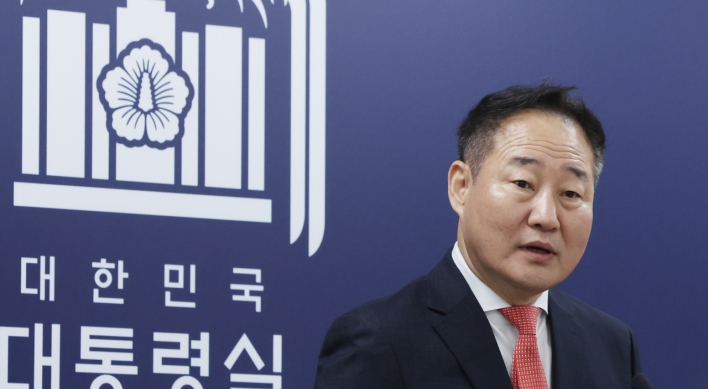Financial markets continue to fall
Deputy P.M. calls for contingency plan, liquidity support for SMEs hit by sanctions against Iran
By Park Hyung-kiPublished : June 21, 2013 - 20:27
The Korean financial markets continued to take a beating from the “Bernanke shock” that foretold the near conclusion of U.S. monetary stimulus, spurring worldwide asset selloffs.
Eroded confidence caused the benchmark stock index to approach the 1,800 threshold as soon as the market opened, while interest rates on three-year state bonds surpassed 3 percent. The won also further weakened against the U.S. dollar.
The KOSPI fell about 1.5 percent finishing at 1,822.83 on Friday, following an overnight fall on Wall Street where the Dow Jones Industrial Average dropped more than 350 points. The won lost 9 won against the safe-haven dollar to reach 1154.7 won.
The increased market volatility, triggered by the U.S. Federal Reserve’s sequenced roadmap of quantitative easing tapering, prompted Deputy Prime Minister and Finance Minister Hyun Oh-seok to call on his economic-related ministers to have a contingency plan ready for financial stability.
Hyun said that the planned phaseout of quantitative easing assured the markets that the U.S. economy was heading for recovery.
But at the same time, there were potential risks of capital outflows especially from emerging markets that could further have negative effects on the Korean financial markets.
The finance minister also urged related ministers not to lose sight of such consequences by closely monitoring the capital movements in Korea.
Financial Services Commission Chairman Shin Je-yoon tried to calm the markets saying that the regulatory policymakers plan to implement safeguard measures early next week to counter equity and other asset instability.
Meanwhile, the deputy prime minister said the government will provide a set of relief to small and medium enterprises expected to be hit by toughened U.S. economic sanctions against Iran.
The U.S. transactions regulations against Iran would be expanded to prohibit logistics services and trade of industrial goods such as steel and auto parts to the Middle East country beginning July 1, the Ministry of Finance noted.
This means that almost all global shipping to Iran would come to a halt that is expected to negatively impact some smaller Korean exporters.
The government plans to inject liquidity into SMEs that took a severe blow by this latest development and help them roll over their debt to help maintain operations.
By Park Hyong-ki (hkp@heraldcorp.com)
Eroded confidence caused the benchmark stock index to approach the 1,800 threshold as soon as the market opened, while interest rates on three-year state bonds surpassed 3 percent. The won also further weakened against the U.S. dollar.
The KOSPI fell about 1.5 percent finishing at 1,822.83 on Friday, following an overnight fall on Wall Street where the Dow Jones Industrial Average dropped more than 350 points. The won lost 9 won against the safe-haven dollar to reach 1154.7 won.
The increased market volatility, triggered by the U.S. Federal Reserve’s sequenced roadmap of quantitative easing tapering, prompted Deputy Prime Minister and Finance Minister Hyun Oh-seok to call on his economic-related ministers to have a contingency plan ready for financial stability.
Hyun said that the planned phaseout of quantitative easing assured the markets that the U.S. economy was heading for recovery.
But at the same time, there were potential risks of capital outflows especially from emerging markets that could further have negative effects on the Korean financial markets.
The finance minister also urged related ministers not to lose sight of such consequences by closely monitoring the capital movements in Korea.
Financial Services Commission Chairman Shin Je-yoon tried to calm the markets saying that the regulatory policymakers plan to implement safeguard measures early next week to counter equity and other asset instability.
Meanwhile, the deputy prime minister said the government will provide a set of relief to small and medium enterprises expected to be hit by toughened U.S. economic sanctions against Iran.
The U.S. transactions regulations against Iran would be expanded to prohibit logistics services and trade of industrial goods such as steel and auto parts to the Middle East country beginning July 1, the Ministry of Finance noted.
This means that almost all global shipping to Iran would come to a halt that is expected to negatively impact some smaller Korean exporters.
The government plans to inject liquidity into SMEs that took a severe blow by this latest development and help them roll over their debt to help maintain operations.
By Park Hyong-ki (hkp@heraldcorp.com)






![[K-pop’s dilemma] Time, profit pressures work against originality](http://res.heraldm.com/phpwas/restmb_idxmake.php?idx=644&simg=/content/image/2024/05/08/20240508050705_0.jpg&u=20240508171126)
![[K-pop’s dilemma] Can K-pop break free from ‘fandom’ model?](http://res.heraldm.com/phpwas/restmb_idxmake.php?idx=644&simg=/content/image/2024/05/09/20240509050541_0.jpg&u=20240509173751)










